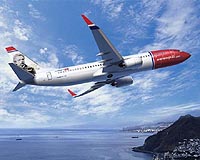 |
Amsterdam, Netherlands (UPI) Nov 25, 2009 Biofuel made a significant headway in aviation as a KLM Royal Dutch Airlines Boeing aircraft using the renewable energy source flew over the Netherlands with about 40 people on board. KLM said it was the first time a passenger aircraft using sustainable biofuel took flight anywhere in the world. The test flight used 50 percent kerosene fuel and 50 percent biofuel in one of the jet's four engines and circled over the Dutch airspace for about an hour before landing at Amsterdam's Schiphol airport, a major European hub for air transport. Analysts said the test was an important step toward a future switch in aviation fuel use from the current jet fuel to biofuel, but progress depends on greater accessibility of sustainable oils needed to produce the new aircraft fuel. Aviation fuel is seen as a major factor in global carbon dioxide emissions and is believed to add up to 4 percent of the total recorded gas emissions into the atmosphere. The biofuel used on the KLM flight is believed to emit up to 80 percent less carbon dioxide than conventional kerosene, and further research aims to secure greater efficiencies critical to fighting climate change. Boeing has already set projections that predict widespread use of biofuels in aviation within the next two years. KLM Chief Executive Peter Hartman said the test flight proved that governments and the private sector could join forces to hasten projects that bring biofuel into wide usage in aviation. Concerns over a perceived air travel role in climate change have spawned pressure groups worldwide that want air transportation greatly reduced and air travel discouraged in favor of more sustainable modes of travel -- yet to be found. KLM said the biofuel was manufactured in Seattle from the camelina plant and imported for the purpose. The airline said it had taken into account the carbon footprint created by the dispatch of the biofuel from the United States to the Netherlands for the test flight. Doubts about the feasibility of biofuels persist, however, because of the sheer scale of the feedstock requirement. Although most biofuels do not require modification to the aircraft engines, because they are a direct replacement for kerosene, producing biofuels will involve vast quantities of biomass as biofuel feedstock. The airline industry burns about 85 billion gallons of kerosene each year. Producing those quantities of biofuel, estimates the Guardian newspaper, would require the equivalent of Europe's land mass to be under cultivation for a renewable source such as soybeans. Boeing is also looking into developing fuels produced from algae. Share This Article With Planet Earth
Related Links Bio Fuel Technology and Application News
 New Facility To Test Aircraft Engines, Alternative Fuels
New Facility To Test Aircraft Engines, Alternative FuelsWest Lafayette IN (SPX) Nov 19, 2009 Purdue University will operate a new federally funded facility to test aircraft engines and develop alternative fuels in work that also aims to reduce the nation's reliance on imported oil. The National Test Facility for Fuels and Propulsion is funded with a $1.35 million grant from the U.S. Air Force and will be housed in the Niswonger Aviation Technology Building at the Purdue Airport. ... read more |
|
| The content herein, unless otherwise known to be public domain, are Copyright 1995-2009 - SpaceDaily. AFP and UPI Wire Stories are copyright Agence France-Presse and United Press International. ESA Portal Reports are copyright European Space Agency. All NASA sourced material is public domain. Additional copyrights may apply in whole or part to other bona fide parties. Advertising does not imply endorsement,agreement or approval of any opinions, statements or information provided by SpaceDaily on any Web page published or hosted by SpaceDaily. Privacy Statement |